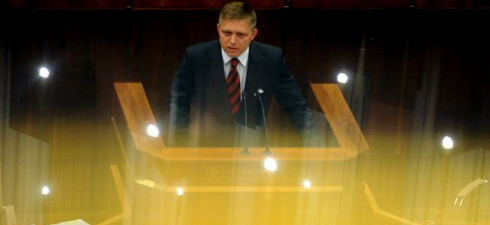If Slovakia definitively fails to approve the Euro rescue funds, it will nevertheless return to being the “black hole of Europe”. Nor will this happen even ifRobert Fico returns to power after the fall of the Radičová government, no matter what this fully-fledged successor toex-PM Vladimír Mečiar gets up to – which is almost anything.
Unlike during the authoritarian Mečiar era [the populist leader governed with 2 short interruptions from 1991 to 1998], when Slovakia seceded from the Czechs, we are now members of NATO and the European Union. So long as we remain so – which is no eternal certainty – Western democracies will not be able to tackle either the development of Slovakia’s domestic politics nor its foreign policy orientation simply by ignoring it and following what actually goes on here from a distance, and with minimal interest.
All the same, this does not mean that we could not very easily disappear into a kind of isolated twilight zone - a country whose leaders take part in EU and NATO meetings, but are only there to make up the numbers, of no sincere interest to anyone.
A swing back towards the east
Cooperation will be restricted to the necessary minimum. Slovaks will not be invited to bilateral negotiations in democratic countries, not even to negociations with their neighbours; they will not discuss significant investments with investors from democratic countries who, apart from bringing capital here, would also be bringing along advanced technologies and more serious ways of doing business.
However, if the standing of Slovakia does come to this, it will only be indirectly due to parliament having rejected an increased contribution to the euro bailout funds. It will come to this should the fall of Radičová and a return to a Fico government end that short episode of pro-Western orientation and democratic development that Slovakia has recently enjoyed.
Foreign policy will swing back towards the east, which has always tugged at Fico’s heart, and will lead to consequences that his previous government had just begun to work on – curbs to democracy, freedom of speech, legal certainties, oppressed minorities and free enterprise.
Translated from the Slovak by Anton Baer
Opinion
Bailout hostage to political manoeuvres
"SaS [Freedom and Solidarity Party] has blocked the European bailout fund," headlines the Slovak daily Hospodárske noviny following the rejection, by the Slovak Parliament on October 11, of a bill approving the fund's expansion. Only 55 out of 150 members of parliament voted in favour of the bill. Prime Minister Iveta Radičová, who equated the ballot to a vote of confidence, immediately resigned.
Freedom and Solidarity, the party led by the President of the Parliament, Richard Sulik, which represents 12% of the national vote, opposed the bailout fund, saying that it was "against bailing out debts with another debt". The fate of the euro is now in the hands of the opposition, the populist Robert Fico, whose Smer Party abstained from the vote. He has since declared that he "is ready to hold talks with the ruling coalition about his support for the fund in a second vote".
"In this conflict between the sovereignty of the people and the physical laws of global economics, Slovakia has shown that it is not prepared mentally (...)", opines Slovak daily SME. The question now is whether early elections will be scheduled, for the spring at the earliest, or whether the government will just be reshuffled without Iveta Radičová.
Was this article useful? If so we are delighted!
It is freely available because we believe that the right to free and independent information is essential for democracy. But this right is not guaranteed forever, and independence comes at a cost. We need your support in order to continue publishing independent, multilingual news for all Europeans.
Discover our subscription offers and their exclusive benefits and become a member of our community now!












